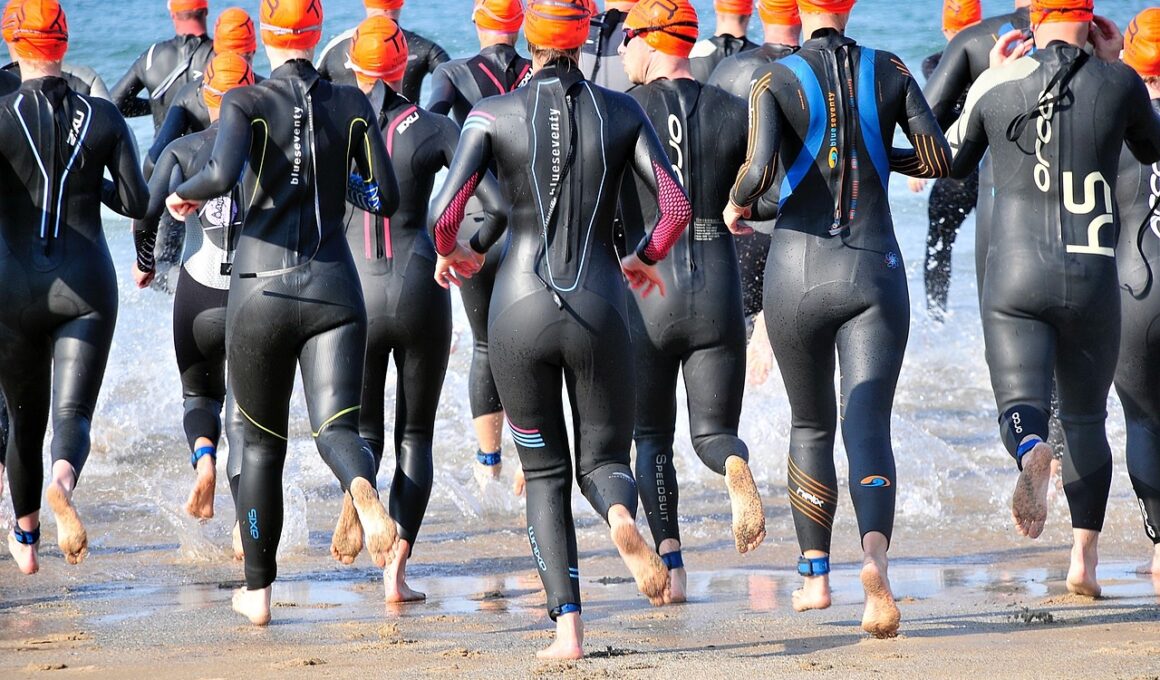Traveling for Triathlon: How I Prepared for an Out-of-Town Race
Preparing for an out-of-town triathlon can be both exciting and challenging. One major aspect to consider is planning your travel logistics. Before booking flights or accommodations, researching the race location is vital. Knowing the race course, the climate, and local amenities will help gauge what to pack. I always create a checklist to ensure I have the essentials covered. Here’s a basic list of things I focus on:
- Swim gear: goggles, wetsuit, swim cap.
- Bike necessities: helmet, shoes, tools, spare tubes.
- Running attire: shoes, comfortable clothing, a hat.
- Nutrition: gels, bars, hydration supplies.
Once I have everything packed, another important thing is to consider your arrival time. I prefer arriving a few days in advance to acclimate. More importantly, this allows me to visualize the race route, which significantly boosts my confidence. Lastly, I always coordinate with fellow triathletes if possible; sharing the experience makes preparations easier and more fun!
Another critical aspect of preparing for an out-of-town triathlon is the nutrition plan. For race day, having a nutrition strategy is crucial for optimal performance. I make sure to consume a balanced diet in the days leading up to the race. This includes plenty of carbohydrates, proteins, and healthy fats. Additionally, I focus on hydration to ensure my body is fully primed. On race week, I prefer to stick to foods that I know agree well with my digestion. Trying new foods can be risky, so I pack my favorite energy gels and bars. I also create a meal schedule leading to race day. This helps avoid any surprises and ensures steady energy levels. One essential tip I learned is to eat meals and snacks at the same times I would at home. On race day, I wake up early and have a light breakfast that includes carbs and some protein. This reliable routine is essential for staying energized throughout the race. Remember that nutrition impacts performance; planning this out can make a significant difference!
Race Day Logistics and Preparation
On race day, staying organized is key to a successful triathlon. Arriving early, I prioritize checking in, picking up my race packet, and familiarizing myself with the transition area. Setting up my gear in an orderly fashion ensures I can quickly grab everything when it’s needed. A tip I follow is to lay out my gear in a systematic order; this helps reduce any race-day anxiety. I always find it beneficial to do a mental rehearsal of the transitions. This procedure includes the swim-to-bike transition and the bike-to-run transition. Also, I scout out the swim start, which helps calm any nerves. Planning allows me to feel in control, leading to better performance. It’s also essential to stay informed about weather conditions; sometimes, they can change unexpectedly. Having a backup plan for rain or cold temperatures is something I take very seriously. I always bring additional layers just in case. Lastly, I focus on maintaining my energy levels without overdoing it, ensuring I feel ready and confident when it’s time to hit the course!
During an out-of-town triathlon, adapting to new environments is equally essential. Local climates and terrains can significantly differ from what I’m used to training in. Consequently, it’s prudent to arrive in advance to give my body time to adjust. For instance, if the race is in a higher altitude location, I focus on acclimating. This means engaging in lighter activities like walking or short runs. I also consult weather forecasts and adapt my attire accordingly. Depending on expected temperatures, I prepare my gear for both the cold and the heat. Learning to adjust my hydration habits according to humidity levels is crucial for performance. More often than not, the changes in the climate influence my pacing strategy during the race. I track my body’s responses closely to gauge whether to speed up or take it easy. Another aspect I always prepare for involves the local terrain; if the race includes hills, it pays off to practice similar workouts beforehand. This comprehensive approach helps maximize my performance and overall race experience!
Post-Race Recovery Plans
After crossing the finish line, I focus on recovery, which is as necessary as preparation. Immediate attention to hydration and nutrition is crucial. Within thirty minutes post-race, I consume a recovery drink, rich in protein and carbohydrates. I also keep healthy snacks on hand, like bananas and bars. This helps replenish what was lost during the race. Stretching out and cooling down after an intense physical ordeal alleviates any muscle stiffness. I prioritize foam rolling and gentle yoga stretches. Rest is equally significant; after the race, I take a few days off from intensive training. Giving my body a break allows muscle fibers to repair and grow stronger. Additionally, visiting a physiotherapist can help address any muscle imbalances that crop up during racing. Staying connected with my coaches for feedback on performance is invaluable for further improvement. Lastly, I make sure to reassess my race experience, noting what went well and what didn’t. This reflection aids future training and planning for consecutive races.
Traveling for a triathlon presents a unique opportunity for personal growth and adventure. Each race teaches me something invaluable about resilience and determination. Embracing the challenges of unfamiliar places enhances my racing experience. I always aim to enjoy the local culture, which adds an exciting element to my travels. Whether exploring local cafes or visiting landmarks, these experiences shape my time at triathlons. Networking with fellow athletes is another benefit of attending races outside my local area. I make new friends often, sharing tips and motivation. Many triathletes offer local insights, which can help identify training routes and nutrition spots. Additionally, participating in races around the world opens up possibilities for travel. Soon, I can add destination races to my bucket list, mixing adventure and sport. This fulfilling aspect inspires me to keep pushing forward in my training. Ultimately, every out-of-town race fuels my passion for triathlons and creates unforgettable memories along the journey.
Final Thoughts on Out-of-Town Races
In conclusion, preparing for an out-of-town triathlon requires careful planning and execution. The logistics of travel, nutrition, transition arrangements, and post-race recovery all play significant roles in ensuring success. When approaching your next race, embracing adventures outside of your comfort zone yields tremendous growth potential. Use your experiences to refine your training and race strategies further. Building networks within the triathlon community enriches both your racing and travel experiences. Always remind yourself to remain adaptable – the unknown can sometimes reveal more than comfortable familiarity. Armed with these strategies, approach your next out-of-town triathlon with renewed energy and excitement. This journey engenders not only passion and perseverance but also unforgettable memories. Ultimately, conquering a triathlon race far from home unites the thrill of competition with the allure of exploration. The finish line is just the beginning of a story filled with transformation. Remember that every race adds a new chapter in your triathlon journey!
Moreover, I encourage sharing your adventures and learning from others in the triathlon community. Connect with fellow racers through social media platforms and forums. Open discussions can provide insights and fresh ideas for your future races. Engaging in these conversations helps foster a community of support and mentorship. Observing how others tackle similar challenges creates motivation and inspiration. Experimenting with various training methods can also enhance your performance. With the collaborative nature of triathlons, we can all learn from each other. Through teamwork and camaraderie, we elevate our sport to new heights. So, as you prepare for your next out-of-town triathlon, remember that the shared experiences shape not only your journey but the entire triathlon community as well. Embrace the challenges, learn from every race, and continue pursuing excellence. Enjoy your journey through triathlons, and discover how much further you can go in both racing and personal growth!


